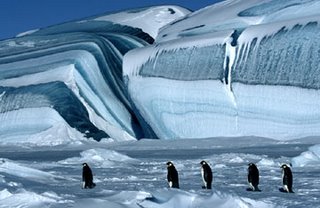 Beks and I watched "The March of The Penguins" last night. Anyway, for those of you who haven't seen it yet, these penguins brave like severe winters and 70 mile hikes in absolute darkness and freezing cold to have progeny. After the mother lays the egg, the father then looks after the egg for like 2 months of the harshest winter ever while the mother goes back into the water to feed. All the fathers then huddle up together to try and sheild themselves from the cold and protect their eggs, without eating anything for like a 120 days. Many of them lose their lives to the cold.
Beks and I watched "The March of The Penguins" last night. Anyway, for those of you who haven't seen it yet, these penguins brave like severe winters and 70 mile hikes in absolute darkness and freezing cold to have progeny. After the mother lays the egg, the father then looks after the egg for like 2 months of the harshest winter ever while the mother goes back into the water to feed. All the fathers then huddle up together to try and sheild themselves from the cold and protect their eggs, without eating anything for like a 120 days. Many of them lose their lives to the cold.Anyway, animals do all this out of instinct. I don't think they consciously make a choice that they want to have offspring, it is imprinted into them. I don't think a male penguin will say "Bollocks to that, I just wan't to stay here and have some good food, or try to swim to warmer places". Jonathan Livingstone Seagull is just a story.... If there was a particularly harsh winter, I doubt whether the next year whether the number of penguins deciding to risk it and mate will decrease.
Freedom of choice is "God's greatest gift to man". Free will is what separates us from animals. But it also brings a whole lot of other problems. So many times in my life, I have thought it would be just easier if we didn't have to choose, if it was predetermined and we had no other choice but to do things in a particular way. I think the biggest obstacle which arises from free will is our clinging to life. The penguins try to protect themselves and their young from predators but I don't think they really "fear" death as we do. They understand that death is as natural as life, and even if they lose an egg or an offspring to the cold, they don't get tied down by it and move on with their lives, continuing the same process next year.
I find this clinging to life, and fear of death is a paradox. Especially since most people (i'm not sure of the statistics here) know that they are not just the body. Since every observation needs a subject and an object, and since we can observe the body, we know we are not it. The same logic also tells us that we are not the mind, that we are something beyond it. Anyway, so why do we fear losing something which we don't even believe is "us". Why do we grieve for those who die? It is only attachment, and we don't really grieve for the dead but for the loss we feel.
4 comments:
Sometimes we grieve for the person, if the person who dies is young and had a long way to go in going through all the phases of life. But when the person is old and has lived their life, it is certainly because of our attachment to them.
"What the mind doesn't know the heart doesn't grieve about"
Attachment is in the mind. It is possible to use the power of suggestion to make the mind believe that there is no such thing as attachment. Thus going by my quote above- there will be no grief.
:-)
You saw how the mother penguin cried when her chick died. She literally moaned. The instinct for the life of one's offspring is very strong in all the higher animals (birds, mammals. It is one of the hardest things for a human parent too, to have one's child die. For that, whatever detachment is practised, I don't think the pain ever quite goes. It's all probably an instinct built in to keep the species going.
s:- as long as one understands that he or she is not "the body", then one ceases to believe in death altogether. therefore, there is no cause for grief. if the person is young or old doesn't matter, there was some purpose to it which we do not understand.
juggler:- yes, my point exactly. without attachment, there would be no grief.
mamma:- its possible that its the instinct which makes parents grieve. but attachment is also an instinct which one has to work on. as long as one has an intellectual conviction of it, then any "grief" experienced can be concluded as due to something internal, not due to the "external" "death".
Post a Comment